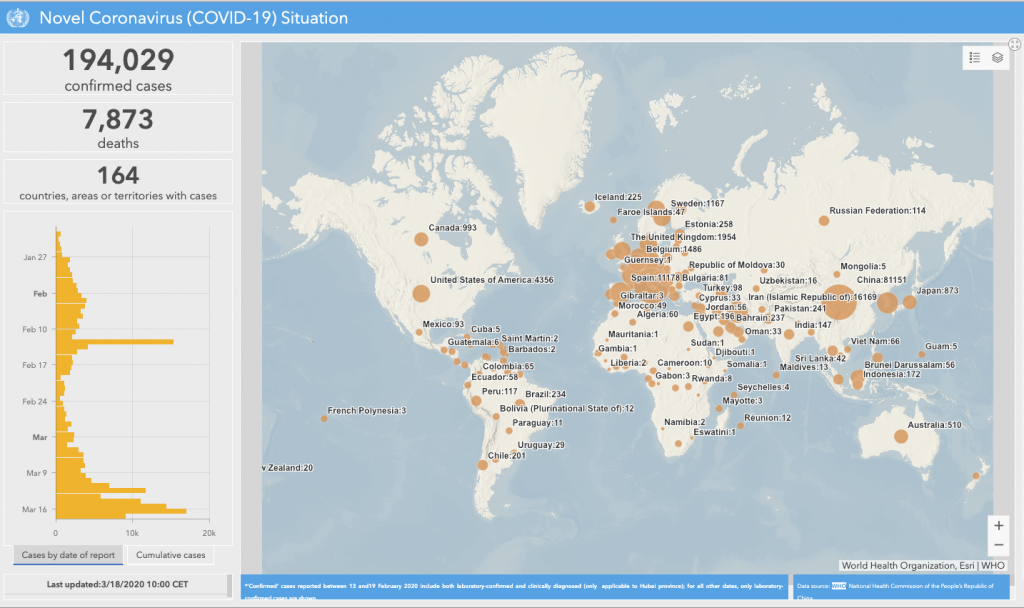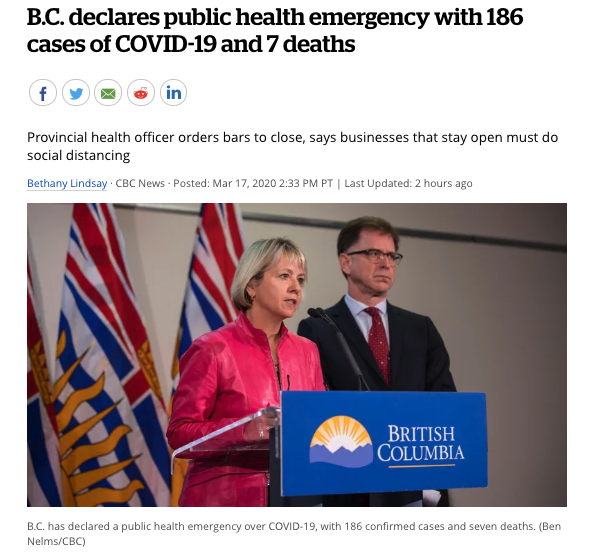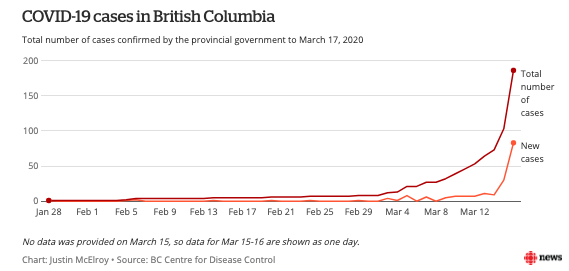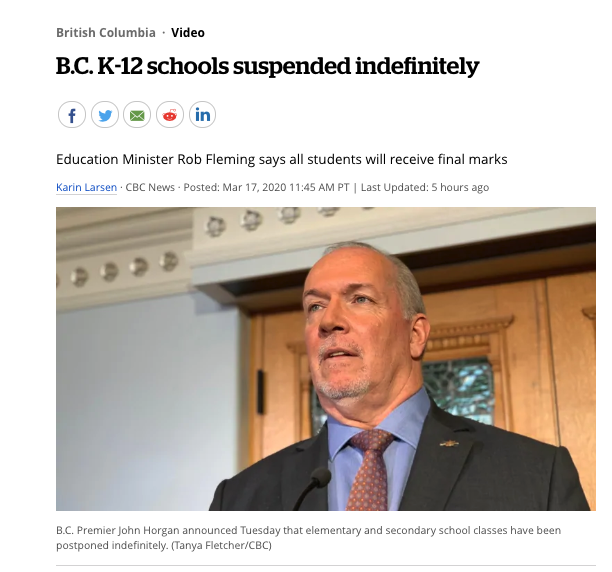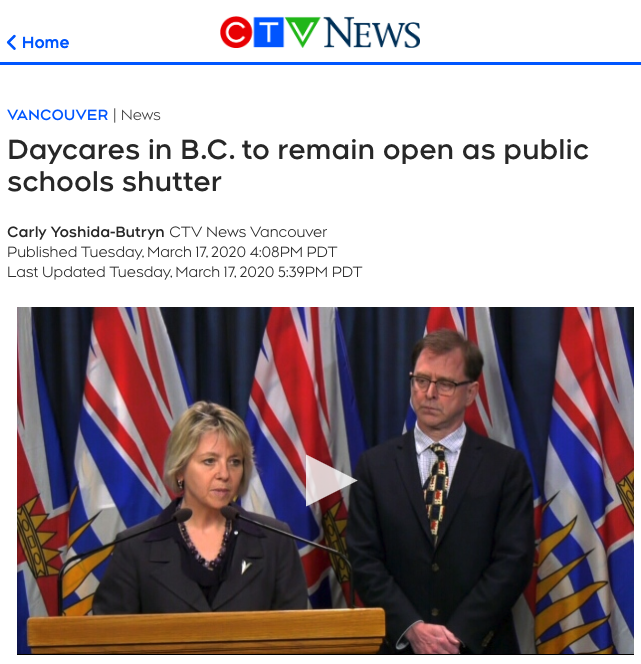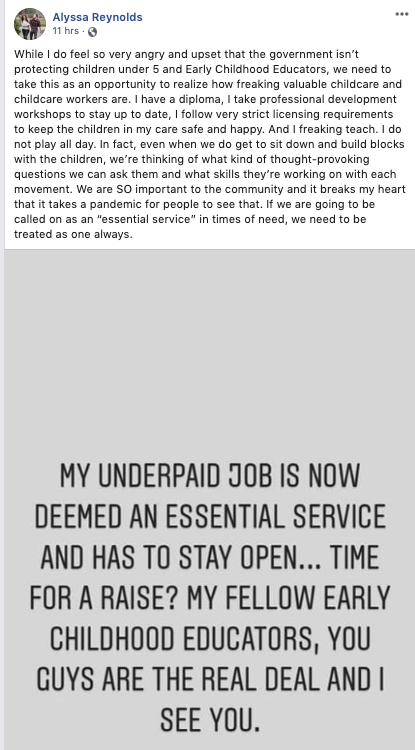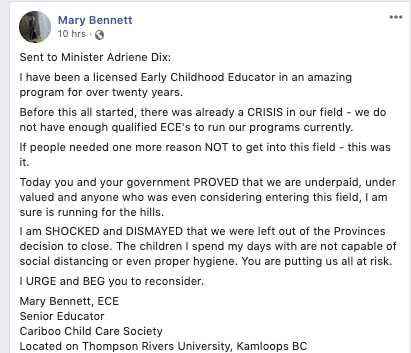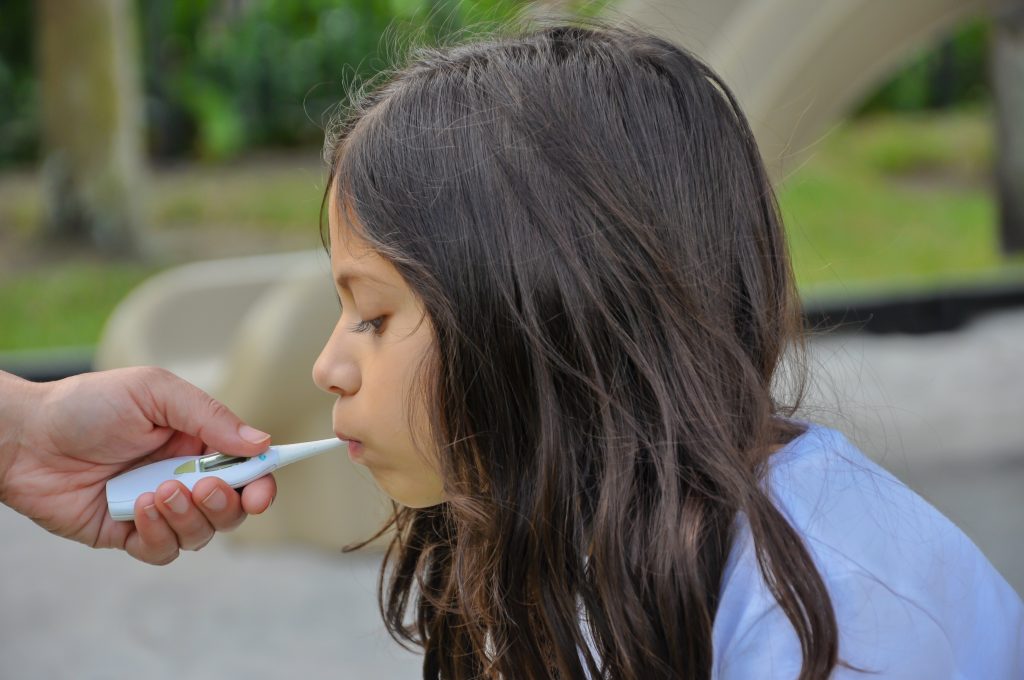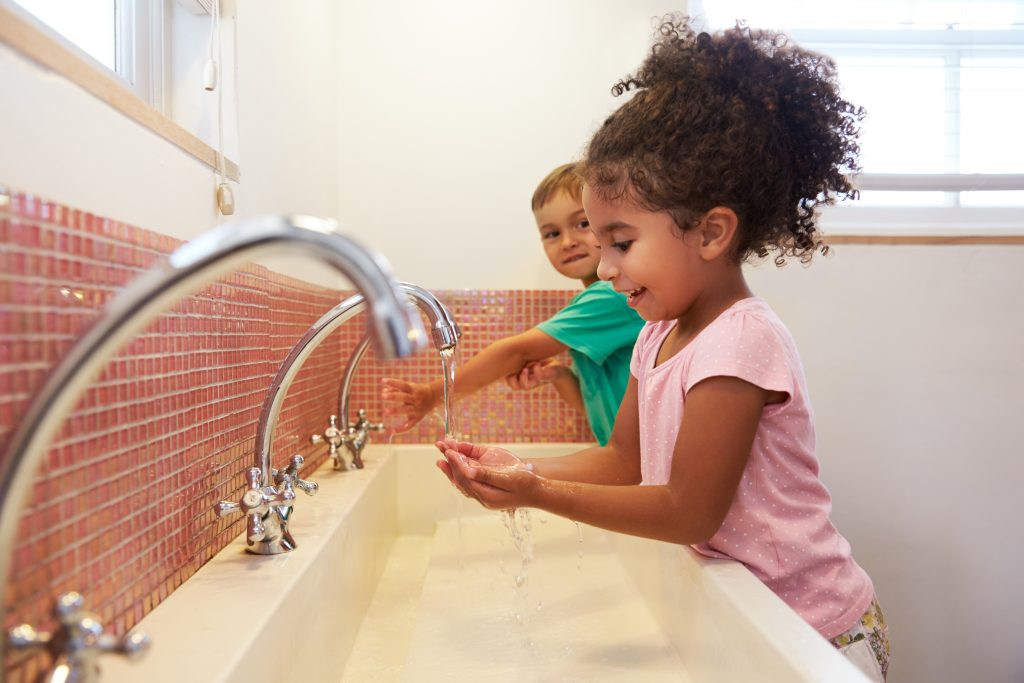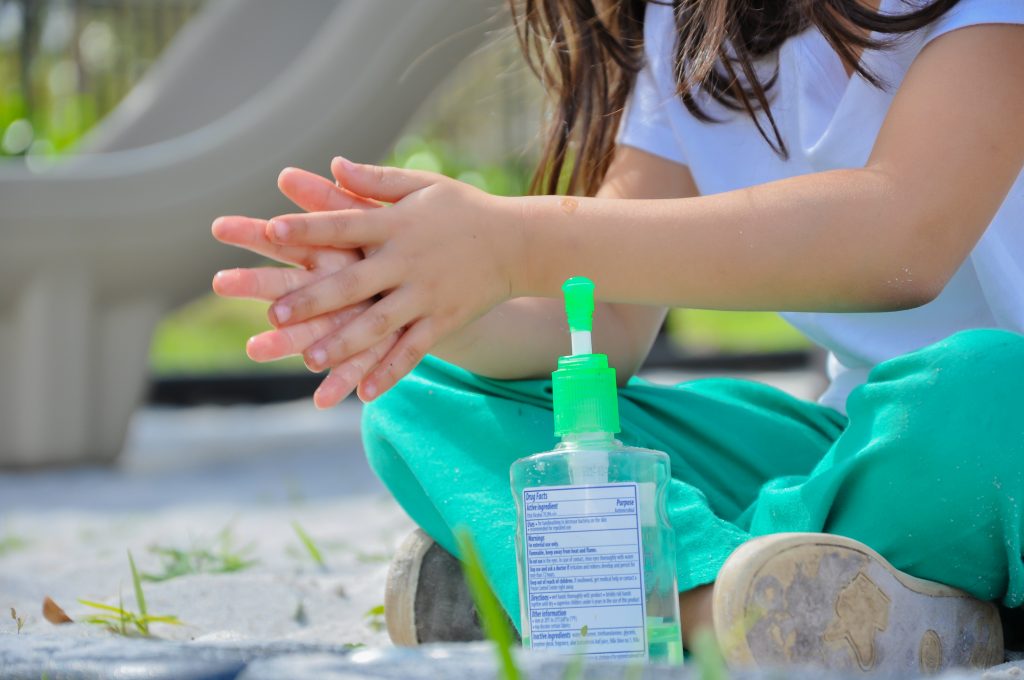
We are in the midst of a global pandemic – COVID-19. The entire world is being impacted and everything about life as we know it is changing – locally and globally — moment by moment — hour by hour — day by day.
On March 17, 2020 British Columbia declared a public health emergency. At the time the public health emergency was declared, BC had 186 cases of COVID-19. Additionally, there had also been 7 deaths in BC related to COVID-19. Many difficult decisions are being made right now related to COVID-19 — not only in BC, but all around the world. It would be a gross understatement to say that there is much uncertainty and concern right now. Not only here in British Columbia, but everywhere. This is a scary moment in time.
YET — with all that is going on — the one thing that has not happened so far in British Columbia is this:
Licensed child care has not yet been closed.
Lots of other places, businesses, programs, schools and services have been directed to cease operations or to close — but not licensed child care.
Now I’m the first to accept that COVID-19 is an unprecedented and extreme situation. BUT — we are talking about child care. Child care that serves infants, toddlers, preschoolers and school age children.
Schools have closed.
High schools have closed.
Yet licensed child care remains open — despite the fact that it serves BC’s most vulnerable population.
As an Early Childhood Educator who has advocated for children, families and child care providers for more than 30 years I have NO choice but to speak out. There is so much I want to say — but let’s start with this:
It is NOT business as usual for child care in BC right now.
It’s not even close to usual.
My purpose in sharing this post is to outline important information related to COVID-19, recent communications with the BC government by key organizations in the BC ECE/child care sector related to COVID-19 and to provide a platform for many of my colleagues to also voice their concerns. It is essential that we, who work in the field of ECE and child care in BC, speak out right now. Our courage is needed on behalf of the children and families that we serve.
Looking at COVID-19 in this Moment
Before I further jump into the BC child care details, I feel it is critical that I share a few snapshots in time related to COVID-19 — if only for us to remember this exact moment and to place some context behind the concerns that we share. By now, I’m sure this information won’t come as a shock to anyone — but — trigger warning — I am going to share some disconcerting information regarding COVID-19.
This is a screenshot that was taken of WHO (World Health Organization) data at about 11:38 pm on March 17, 2020 Pacific Time regarding the Novel Coronavirus (COVID-19) Situation.
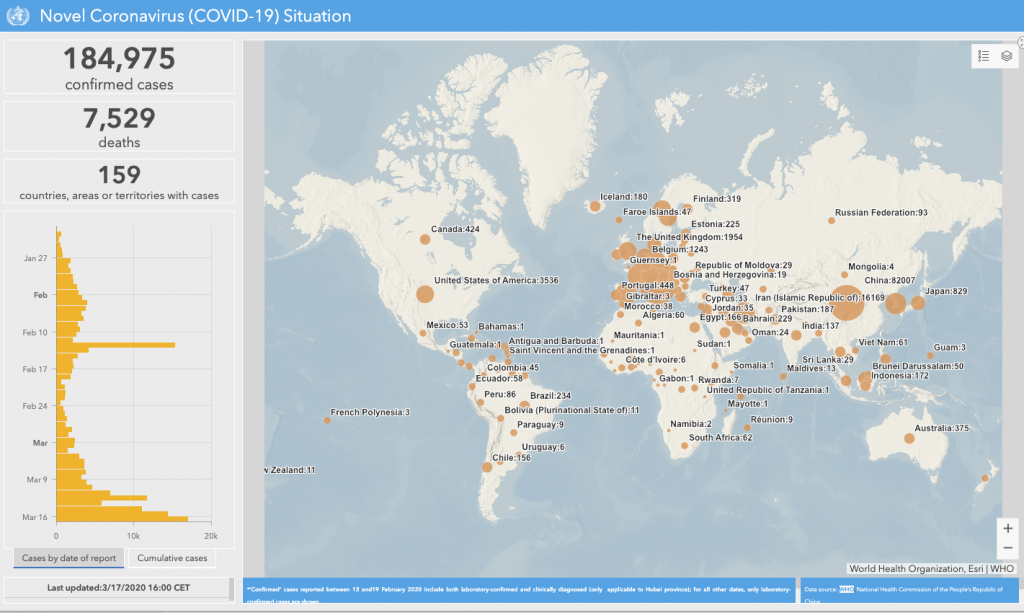
And the image below is a snapshot from the UNESCO website. It was taken at 11:32 pm in the Pacific Time zone on March 17, 2020.
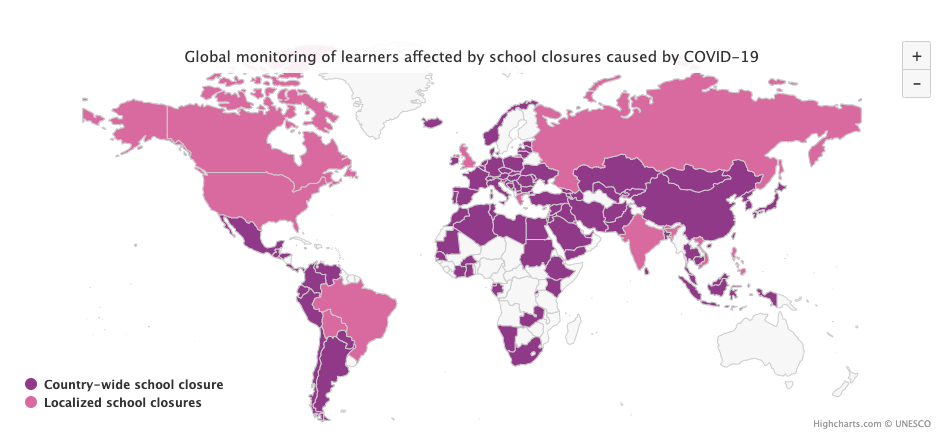
At that time the UNESCO website said the following:
The number of children, youth and adults not attending schools or universities because of COVID-19 is soaring. Governments in 113 countries have now announced or implemented the closure of educational institutions in an attempt to contain the global pandemic.
According to UNESCO monitoring, 102 countries have closed schools and educational institutions nationwide, impacting over 849.4 million children and youth. A further 11 countries have implemented localized school closures and, should these closures become nationwide, tens of millions of additional learners will experience education disruption.
Plus there’s the findings of a new virus report that was recently released by Imperial College London. The New York Times reported that:
The report, which warned that an uncontrolled spread of the disease could cause as many as 510,000 deaths in Britain, triggered a sudden shift in the government’s comparatively relaxed response to the virus.
American officials said the report, which projected up to 2.2 million deaths in the United States from such a spread, also influenced the White House to strengthen its measures to isolate members of the public.
Imperial College carry a lot of weight because, according to the New York Times article they have:
” . . . advised the government on its response to previous epidemics, including SARS, avian flu and swine flu. With ties to the World Health Organization and a team of 50 scientists, led by a prominent epidemiologist, Neil Ferguson, Imperial is treated as a sort of gold standard, its mathematical models feeding directly into government policies.”
And in what can only be described as a surreal moment, while I was writing this post, Neil Ferguson (the lead epidemiologist of the report) tweeted that he himself may have contracted COVID-19
Sigh. Developed a slight dry but persistent cough yesterday and self isolated even though I felt fine. Then developed high fever at 4am today. There is a lot of COVID-19 in Westminster.
— neil_ferguson (@neil_ferguson) March 18, 2020
And then there’s the release of another recent study of more than 2000 children. It was of children with the virus in China and it found that while most develop mild or moderate symptoms, a small percentage — especially babies and preschoolers — can become seriously ill.
Sigh. Indeed.
Clearly something very big and very concerning is going on all around the world.
Looking at British Columbia in this Moment
And so yes, a public health emergency was declared in British Columbia on March 17, 2020.
According to this chart as shared by the CBC this is what COVID-19 cases in BC looked like around the time that the public health emergency was declared.
Over the last few days we have seen lots of different closure announcements start to happen in British Columbia.
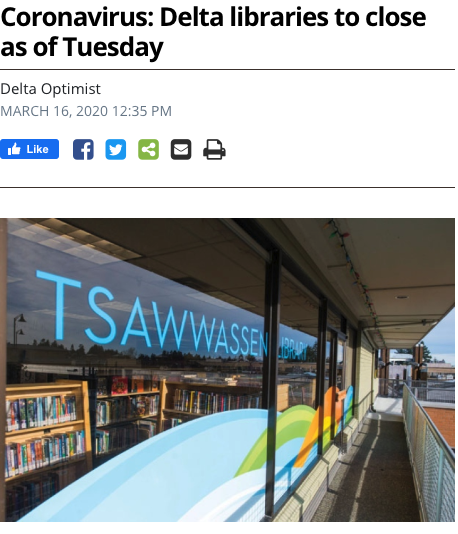
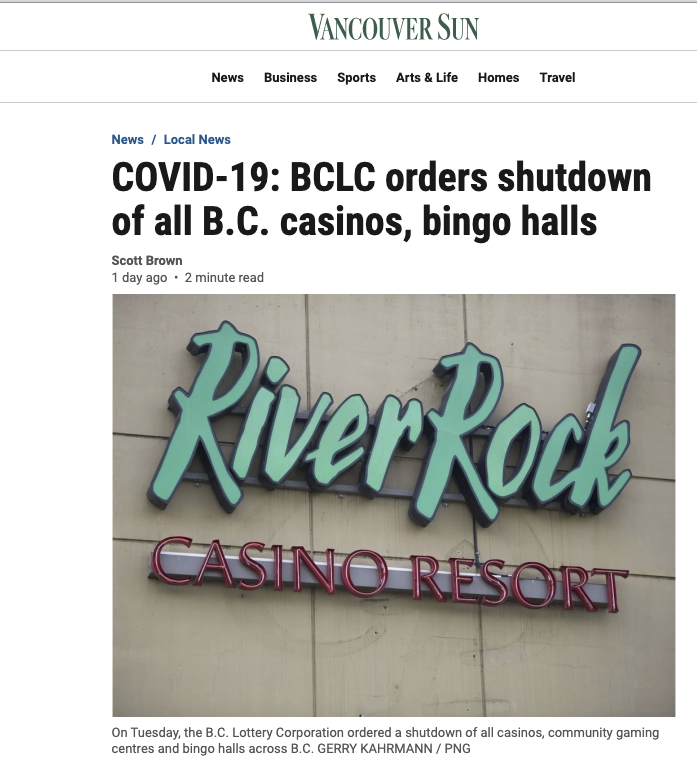
On March 17, 2020 the BC Government announced that school classes have been suspended indefinitely.
Additionally, bars and restaurants were told to also close — unless they are able to move to take out and delivery.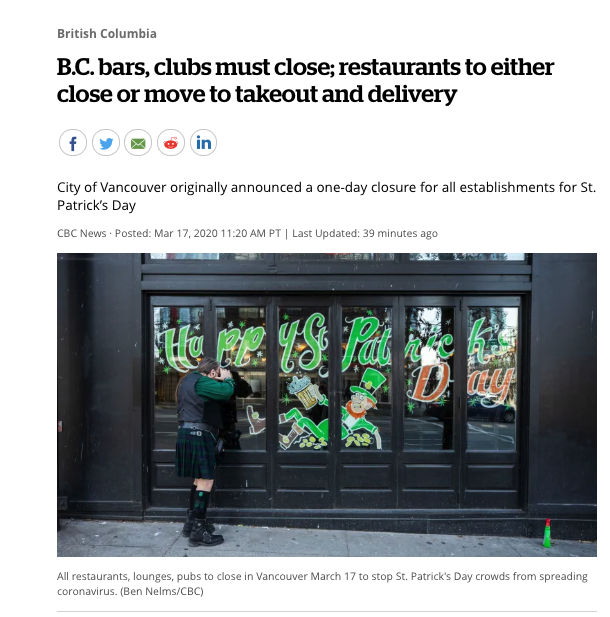
YET — in the face of all the above — the BC Government still chose not to close child care.
BC child care remained open despite the fact that licensed child care has already been closed in Nova Scotia, Alberta, Quebec, New Brunswick, Newfoundland & Labrador as well as in Prince Edward Island. Child care is also closing in Manitoba very soon.
Early Childhood Educators and Child Care Professionals Have Been Speaking Out
Now — let me be clear when I say this — as Early Childhood Educators and child care professionals we understand how important child care is. We know how truly critical quality child care is to the economy. And we completely recognize that the provision of child care for the children of front line health care professionals during a global pandemic is essential. We understand that a plan needs to be put in place rapidly to support this. It is for this exact reason that many in the field have been trying to engage with the BC government related to the potential of COVID-19 and what it would ultimately mean for BC’s children, families, Early Childhood Educators and child care operators.
On February 27, 2020 the BC Child Care Owners Association (BCCOA) requested technical-operational information for child care providers from the BC government in the event closures would be required due to COVID-19. According to representatives of the BCCOA, while some information was provided, there was no response to questions asking for clarification of details – details that were significant to operators who needed to assess paying rent, EI top ups or wages, and if / how much of parent fees would need to be charged in the event of child care closures due to COVID-19.
So on March 13, 2020 the BCCOA wrote a follow-up letter to Minister Conroy, Minister Chen, Christine Massey, Anne Wetherill, Stephanie Hall in the BC Government in an attempt to gain more information. As part of that letter they communicated the following:
Child care programs across BC need to have a contingency plan in place, in the event child care programs or schools are temporarily closed due to Covid19.
Child care operators need to determine what fees parents will be required to pay during a closure and if staff must be laid off, and then apply for EI or if they can continue to be paid. For many ECE’s in BC, they simply can not afford to be laid off and take reduced pay; for many parents, having to pay fees while not working could be financially devastating. It may surprise you to find that many operators have been told by their insurance provider that closures due to a pandemic, even when required by the health department, will not be covered under business interruption insurance which could easily lead to unpaid leases and mortgages. Your CCFRI policies, which do not include “contingency fund” as a reason to justify fee increases for the past two years, have lead to many providers across the province to be operating with no emergency contingency fund, or to be slowly depleting it to instead pay for ECE wages. As a result, many child care operators are looking at potential closures with dread, anxiety and fear.
And while there was a response letter from the BC government (as well as information from the regional health authorities) that was sent to BC child care programs on March 13, 2020; the reality is that the information that was provided within the letter did not contain enough detail for many of BC’s child care programs to know how best to proceed in the face of rising cases of COVID-19.
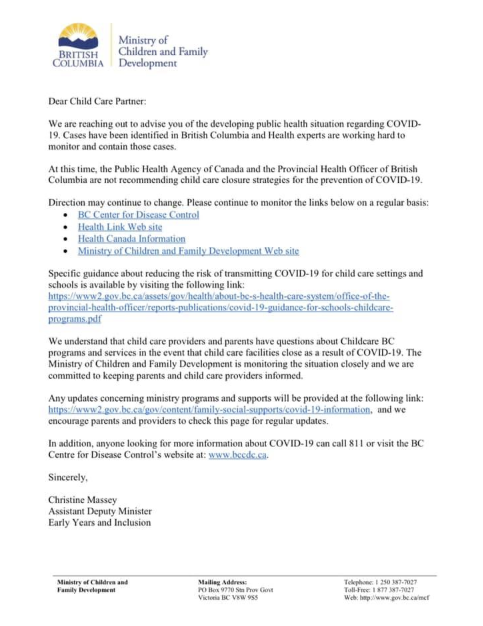
As a result of increasing concerns, on March 16, 2020 the BCCOA again wrote to Minister Conroy, Minister Chen, Christine Massey, Kevena Hall, Anne Wetherill, Stephanie Hall. As part of that letter they stated:
As the professional association for BC Child Care Professionals – owners, operators, director and educators – the BCCCOA is gravely concerned for our Educators in BC as the Covid19 pandemic continues.
and
For the programs who are remaining open, we are concerned that Early Childhood Educators facing self-isolation requirements, either due to travel or illness or needs to care for family members, are unable to work. This amplifies the existing labour shortage that has plagued the child care sector in BC, leaving children’s health and safety at risk. Safe ratios with qualified staff are unable to be maintained.
On March 17, 2020 — prior to BC declaring a public health emergency, the Early Childhood Educators of BC (ECEBC) sent a letter to Adrian Dix, the Minister of Health. As part of that letter, ECEBC stated:
What are we asking for?
That the Government of British Columbia mandate a full closure of child care centres, effective immediately. That the Government of British Columbia engage with the Federal Government to make a concerted effort to coordinate the funds to allow for the closures to take place.
What are the main messages we want to convey?
Prioritize health and safety of all children who are in all types of childcare settings (as defined by the Community Care Facilities Act), the educators that care for them and by association the family members. We acknowledge that essential service providers may require childcare and so a plan will need to be in place to support them.
The Coalition of Child Care Advocates of BC also wrote to Minister Dix on March 17, 2020 and as part of their letter they stated:
BC families, early childhood educators and child care providers need government to share the public health decisions about school and child care closures promptly, and ensure that:
1. The decision and related rationale, is applied clearly, consistently and province-wide to both schools and child care.
2. Educator wages are protected, without requiring parents to pay for services they cannot receive.
Alberta, Ontario, Quebec, Nova Scotia, PEI, Newfoundland and Labrador and New Brunswick have all announced closures of both schools and child care programs.
Saskatchewan and Manitoba have announced closures of all schools but not child care programs (Manitoba) or only child care programs in schools (Saskatchewan). Is there a public health rationale for treating children in school-based programs differently from those in community-based programs?
And YET — as I have mentioned earlier – ultimately the BC government still chose not to close licensed child care in BC on March 17, 2020. Further, in the 2 different press conferences that they gave on March 17, 2020 they primarily only spoke of child care only when they were asked about it by the media. They made no attempts to proactively address the clear concerns that had been brought to their attention on multiple occasions by the child care/early childhood education sector.
As a result of the decision to keep licensed child care centres open in BC there has been a multitude of concern shared online by virtually all who are connected to the sector. Below is just a sample of what has been shared:
The BCCCOA made this press release on March 17, 2020 and as part of it they said:
Many child care programs have groups larger than the current provincially allowable “large gathering” size of 50. If elementary schools, with their classroom sizes of 20-30, can not remain safe; how are child care programs any different? Child care additionally faces the developmental reality of caring for the province’s youngest children – who can not yet wash hands appropriately, who put toys and hands in their mouth constantly, and can in no way be expected to “socially distance”.
The provincial government is downloading responsibility for public health decisions to individual child care professionals. This is not only irresponsible but negligent and inappropriate.
And ECEBC wrote an open letter to Colleagues which included the following:
In the absence of government action, moral courage is required. We are deeply aware that many of you have been placed in stressful situations, with limited choices and guidance. In order to protect the health and rights of children, our most vulnerable community members, as well as the state of our health care system, many of you have already taken a stand by choosing to close your childcare centre, write letters to your MLAs, and take other stands of resistance. We want to thank you for your leadership, and we encourage others to speak and act.
We recognize that this is an unprecedented time. We are prepared to work with government to address the childcare needs of essential workers. However, this does not mean that we carry on as usual. As professionals, we do want to work in consultation with government to meet the challenges that are facing our province.
Charlene Grey (the past ECEBC Chair) had this to say:
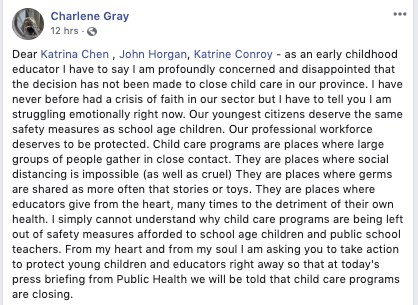
Sometime between the morning and afternoon BC government press conferences I wrote and shared this post:
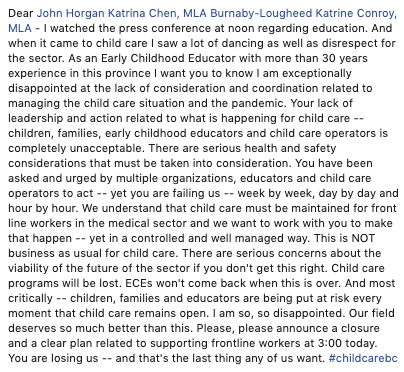
And it didn’t take long for many more child care professionals, Early Childhood Educators and child care operators to begin sharing their concerns, frustration and confusion:
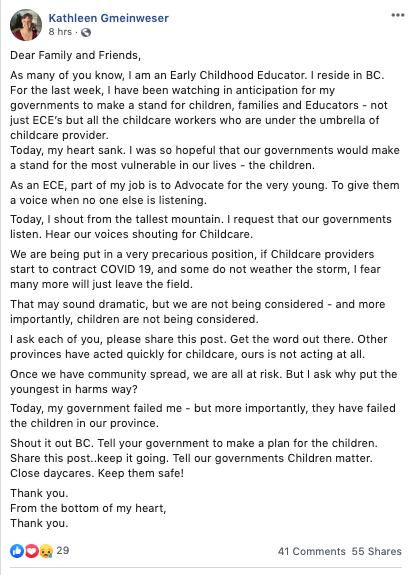
“My health worker clients have all chosen to self isolate their children. There’s a state of emergency, our 0-5 population needs protecting too. If the government won’t do it…I feel responsible to.” ~ Karen Maxwell Eddy
“I can’t afford to close and I can’t afford to stay open. I have less than half my current children attending next month.” ~ Elizabeth Ashley
“I can’t afford to close and I have essential services parents so if I close those parents will be scrambling for care and the children will be lost and confused which isn’t fair to them when their parents is already going to be doing mass hours and being away from home more. Stability is critical for young children, and shipping them off to a new center is not going to be the best option. Non essential should stay home and their kids stay home.” ~ Angelica Bodi
“No transparency or guidance. Lack of governing.”
“How can they say we must have 1-2 meters distance from each other and continue to keep childcare centres open? How are 0-5 year old children any more capable of containing germs than 5-18 year old children? How does it make any sense to close schools, forcing parents to figure out childcare for those children, but somehow 0-5 year old children are covered and can still be in care? The inconsistencies are embarrassing. Other provinces have closed their centres, what is our excuse? Why are we, the province with THE MOST elderly people the one that is behind in all this?!” ~ Marley June Cummings
“I cant afford to close and I have front line workers children in my child care.” ~ Laura Lidstone
“Child care REQUIRES close contact. Coughs, sneezes and drool are unstoppable. Kisses on the bumped knees. Hugs. Carrying a non-walker. It’s the perfect place for COVID19 to spread. This is not flattening the curve. I can’t change a diaper from 2 meters away.” ~ Demi Porter
“I have lost three families withdrawing from their lack of closure.” ~ Jade Baerg, Olive Grove Childcare Ltd.
“Why does the government get to pick and choose which children should stay at home? We are watching/teaching younger children that don’t cover coughs and sneezes every time. They touch everything so why would the government choose to keep them in daycare when older children stay home.” ~ Virginia Reemeyer
“We are an incredibly vulnerable sector, caring for some of the most vulnerable individuals in our communities. While data supports that the elderly are at the highest risk for complications of COVID, children are experts by nature at contracting, carrying, and spreading diseases (lick a doorknob, take food from your friends mouth and then eat it, or sneeze directly into your care providers mouth? This is our all day, every day reality). Despite our best, most engaging efforts, children are developmentally unready to practice the ESSENTIAL self-care skills required in order to prevent the spread of COVID. Delaying closure of childcare centres is putting childcare providers in a very unpleasant situation. On one hand, we have families that feel that we are not doing enough to protect them. On the other hand, we have families expecting us to stay operational despite the inherit risks to ourselves, staff (in larger centres), and families. I can only imagine that the latter families feel we should stay open and operational because government updates are not necessarily conveying the severity and potential risk as we sit at the tipping point of the COVID spread.” ~ Jayla Cummings (as part of her letter to Minister Dix)
And there was this from Tania Lam, Owner Aves Early Education Centre:
“As a childcare operator during these difficult times, I feel like all I can do is worry.I worry everyday for the well-being of my staff and the children in my care who are at-risk by being in a group environment.I worry that if I choose to close, my staff and business cannot survive without government support.I worry that families will suffer greatly if I don’t refund tuition.I worry for my own family members because I put myself at risk by staying open.Before, when the government said they would announce something related to childcare, I felt a bit of hope. That hope isn’t there anymore – it’s replaced with confusion, hurt, and even more worry now. The government has demonstrated that we are not a part of this equation and I’m left, constantly worrying – what will happen to us?”
And this from Reyna Chan:
“I am not normally one to take to social media when things are upsetting me, but I think this is an issue that needs to be addressed. I understand that right now, things are uncertain and people are stressed out. However, it is completely irresponsible for BC to force already underpaid Early Childhood Educators to choose to self-quarantine themselves without pay because our government will not recommend child care closures because we are still at “low-risk.” We should be following the lead from the rest of the provinces and protecting both the child care workers and the families. With a current documented 103 cases in BC, I do not consider that low risk. In the media, we are constantly told to avoid contact, stand 1 meter apart, practice social distancing. Unfortunately, in our field of work, we cannot “social distance” ourselves from the children. We continue to give cuddles, wipe noses, remind children to cover their mouths, and help them wash hands. We are terrified. Many of us cannot just “call in sick” so we are forced to go to work. We are looking for support from our employers, from our city, and from our government. Respect the ECEs. Close the daycares.”
And more . . .
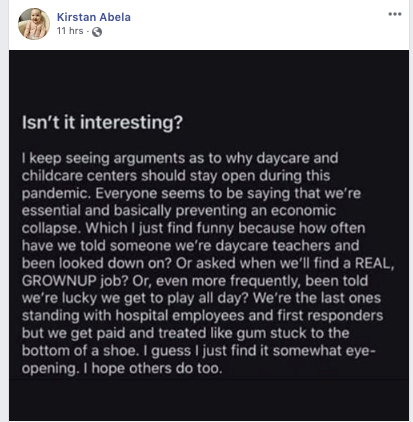
Finally, let’s not forget that there’s also a petition that was started over here. As of now it has close to 5000 signatures on it supporting the statement “Close all daycares in British Columbia to stop the spread of COVID-19.”
At this point I’m not sure what more can be said. Collectively, this post is a tiny contribution to the COVID-19 battle. And in saying that I realize it’s nothing compared to what our health care professionals are facing.
I urge Premier John Horgan, Minister Adrian Dix (Health), Minister Katrine Conroy (MCFD), Minister of State Katrina Chen (Child Care), Minister Rob Fleming (Education) and Dr. Bonnie Henry, (BC Provincial Health Officer) to:
Immediately outline their plan regarding the delivery of child care for the children of front line health care professionals who are working in BC during the COVID-19 global pandemic.
Immediately put in place the financial supports that are necessary to ensure ALL child care programs and Early Childhood Educators are able to weather the financial storm that is happening as a result of COVID-19.
Immediately close ALL licensed child care programs that are not involved in the delivery of child care for the children of front line health care professionals who are working in BC during the COVID-19 global pandemic.
Like I said at the start of this post —
It is NOT business as usual for child care in BC right now.
It’s not even close to usual.
COVID-19 is the biggest threat many of us will ever face in our lives. If ever there was a time to protect BC’s most vulnerable population — our children — while simultaneously protecting ourselves as well as those around us — it is now.
RIGHT NOW.
We must act!
PS – Remember the map I shared from the World Health Organization at the start of writing this post? Well here is what it looked less than 24 hours later.
